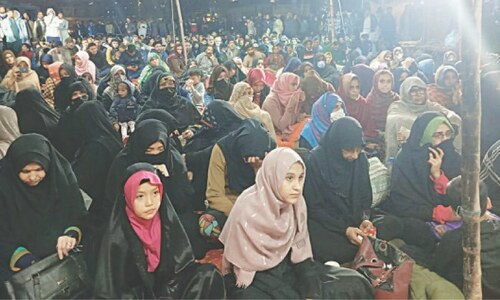When Qudratullah Shahab's autobiography 'Shahabnama' came out, Mushfiq Khwaja commented in his column that it was a good work of fiction. Aside from being fictionalised, as is alleged, autobiographies are notorious for self-centredness; some writers are madly in love with themselves.
Another argument against the genre is that it is very difficult to be honest in an autobiography. And even if one tries to be completely honest, one's memory may deceive one. Also, the writer of an autobiography may stretch some facts and suppress some others. Though autobiographies unveil much about their writers, they may intentionally distort the facts and draw their own conclusions so as to suit their own point of view. Some biographies do unveil, but only as much as they conceal; and some reveal facts only about other people. As someone quipped, “Autobiography is an unrivalled vehicle of telling the truth about other people”.
But I personally prefer what Thomas Carlyle said of biographies: “A well-written life is almost as rare as a well-spent one”. If a life is well-spent, it does deserve to be read because it can enlighten the readers much and they can learn a few lessons on how to live a life. And if it is well-written, it is an added bonus. As for the argument against the genre that it tends to be egocentric, a biography is a genre that is defined as a person's life narrated by himself or herself. So it is impossible for the author not to mention himself/herself while writing his/her own life.
Before autobiography became a literary genre in Urdu, there were some autobiographical accounts that had glimpses of the genre. Some masnavis by Jaffer Zatalli and Mir Taqi Mir, for example, have some sporadic traces of their personal lives. Likewise, writers of some prose works, such as tazkiras, have narrated their lives partially. Ghalib's letters have some invaluable information about his life and the events of his times. Diaries, journals and travelogues, too, present some snippets of lives of their writers. Some interesting narratives, such as Jaffer Thanesri's ' Kala Pani ' and Abdur Razzaq Kanpuri's ' Yaad-i-ayyam ', qualify as Urdu's early memoirs, if not as autobiographies.
Khwaja Hasan Nizami is also ranked among those who wrote Urdu's early autobiographies. Some of Urdu's well-written autobiographies published in the 20th century include Deevan Singh Maftoon's ' Naa qabil-i-faramosh ', Josh Maleehabadi's ' Yaadon ki baraat ', Ahsaan Danish's ' Jahan-i-Danish ', Akhter Hussain Raipuri's ' Gard-i-rah ', Qudratullah Sahab's ' Shahabnama ' and Begum Hameeda Akhter Raipuri's ' Hamsafar ', to name but a few. ' Nuqoosh ' published a special issue on autobiographies in two volumes and named it ' Aap beeti number '.
If a well-known personality writes his or her life in a candid manner and refrains from making himself/herself unnecessarily conspicuous the result usually is a life narrated well.
Prof Dr Abul Lais Siddiqi (1916-1994) wrote his autobiography ' Raft-o-bood ' and it became very popular when an Urdu daily serialised it some 30 years ago. Later, a couple of monthlies ran it as well. Karachi's Idara-i-yadgar-i-Ghalib has now published it in book form.
Known for his scholarly works on linguistics and history of Urdu literature, Prof Siddiqi was a linguist, lexicographer, critic, scholar and academic. Having done his MA and PhD from Aligarh University, he began teaching at Aligarh University's Urdu department. After migrating to Pakistan, he went to the London School of Oriental Studies and later Columbia University for higher studies in linguistics. He taught at Punjab University and Karachi University. At Karachi University's Urdu department he served as the chairman for some 20 years and later was made professor emeritus. As a research guide, he supervised over 50 PhD dissertations.
Prof Siddiqi also worked as the chief editor of the Urdu Dictionary Board and brought out its first six of 22 volumes. With over 20 books to his credit and having the experience of teaching at different universities, including at Columbia University as visiting professor, Prof Siddiqi spent a life that had its share of successes and disappointments, agonies and ecstasies.
' Raft-o-bood ' records not only his experiences and the lessons that he learnt in life but it also reflects the mood and colour of the times that he spent in Aligarh and elsewhere. It portrays the life in Aligarh during the crucial years of Pakistan Movement and the political, educational and cultural atmosphere of Pakistan during its early years. Despite having held some very important posts, Prof Siddiqi has kept his tone modest. The style is simple yet flowing making the reading a pleasure. The book records some very interesting events and personalities, especially the portion that describes life at Aligarh University as student. Some personalities — known as well as unknown — such as teachers, students, staffers, poets and eccentrics of Aligarh have come alive.
The introduction by Dr Moinuddin Aqeel, who has compiled the book, gives a brief sketch of the author's life and achievements.
Dr Siddiqi spent a life well and wrote it well. It will be of special interest to Aligarians who usually cherish anything that belongs to Aligarh which is, perhaps, in true spirit of Aligarh.
drraufparekh@yahoo.com














































Dear visitor, the comments section is undergoing an overhaul and will return soon.